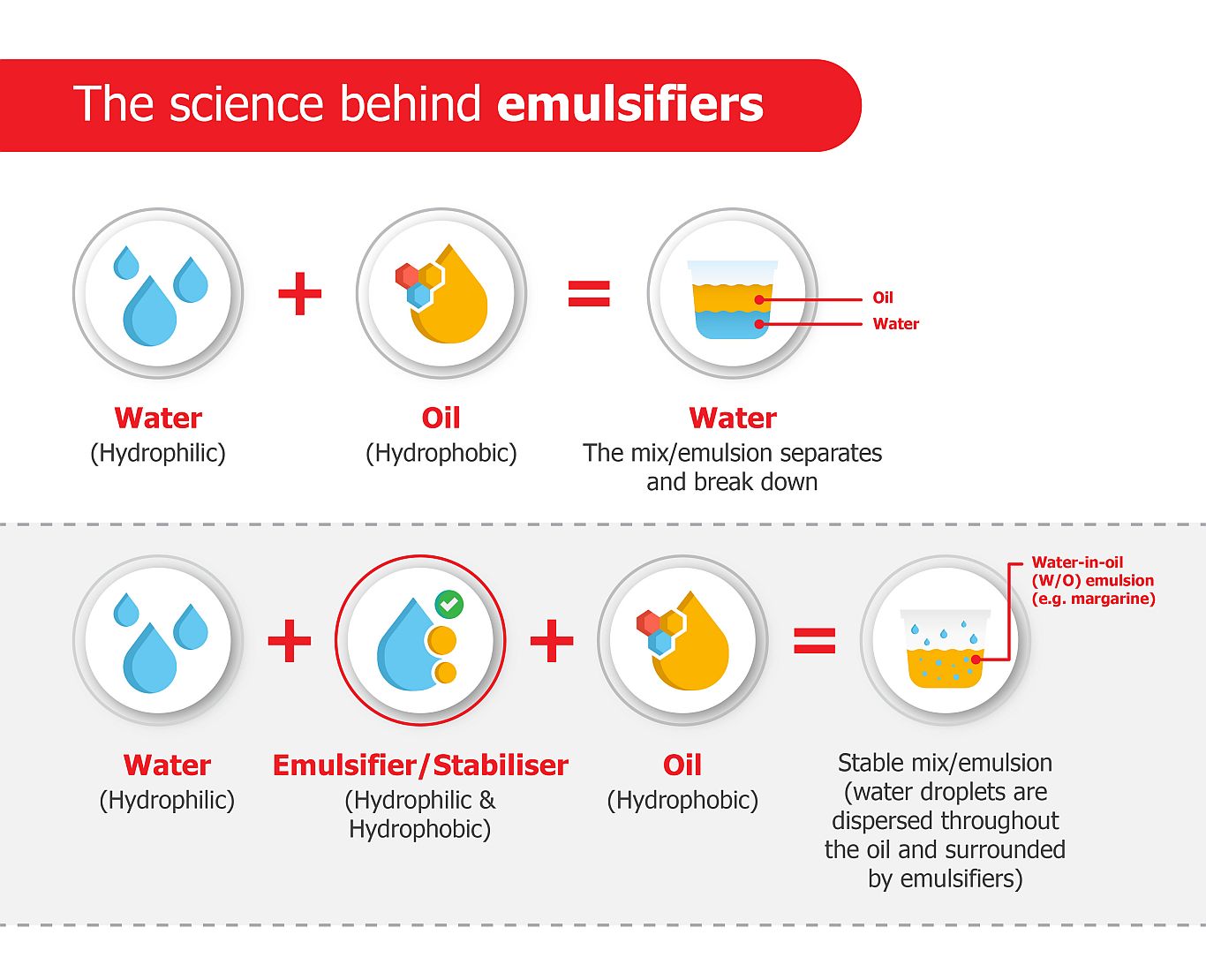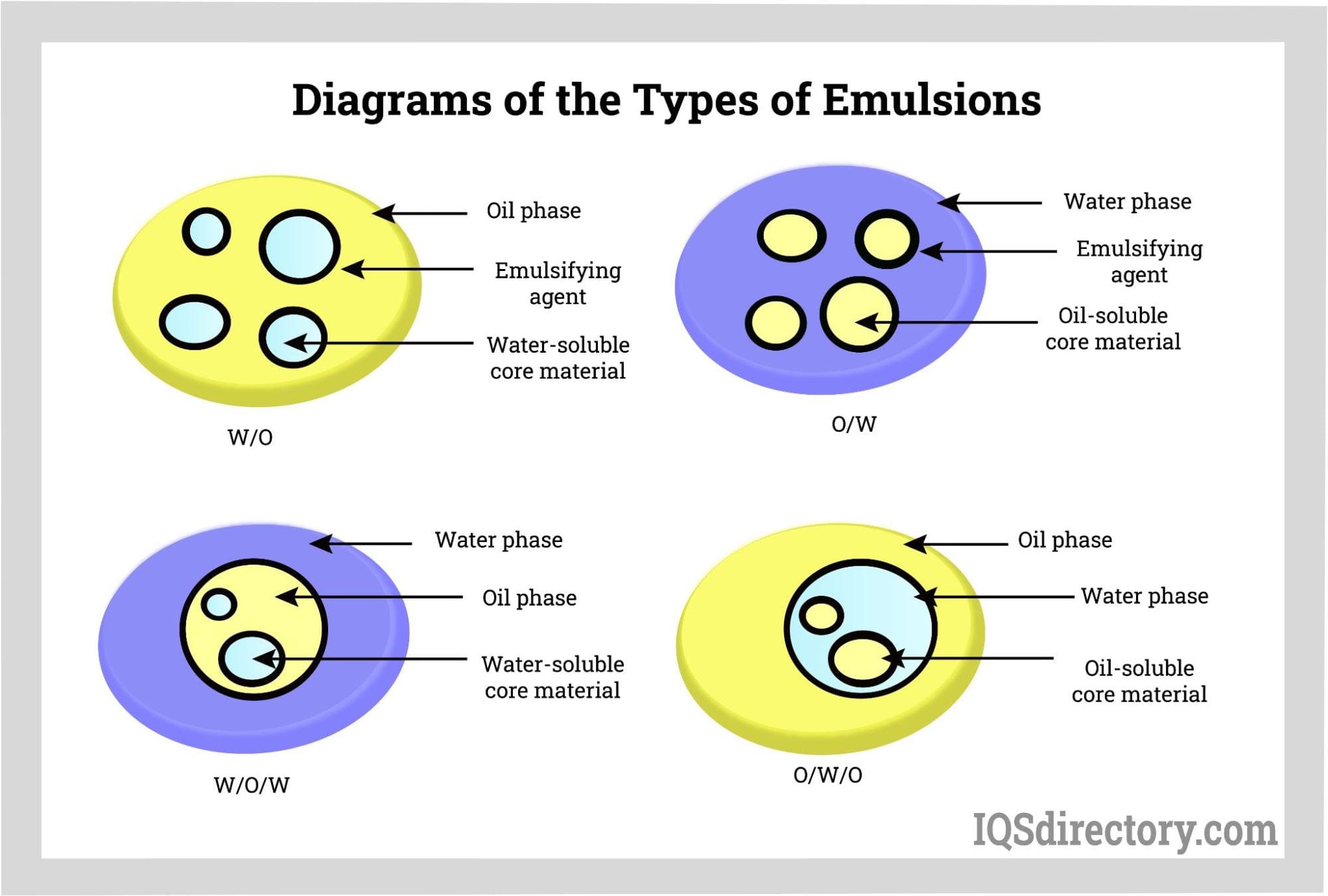What Are Emulsifiers Doing in My Salad Dressing?
What Are Emulsifiers Doing in My Salad Dressing?
Blog Article
The Science Behind Emulsifiers and Their Significance in Modern Production
Emulsifiers play a vital duty in contemporary manufacturing, acting as the unrecognized heroes that blend oil and water for a vast range of items. As customer preferences change towards cleaner tags, the need for innovative emulsifiers is expanding.
What Are Emulsifiers?
Emulsifiers are crucial agents worldwide of food and product production, acting as the adhesive that binds two or else immiscible liquids, like oil and water. You may not realize it, but these substances play an essential function in developing steady blends. They minimize the surface stress between these fluids, allowing them to mix effortlessly. Common examples consist of lecithin found in egg yolks and soybeans, and mono- and diglycerides utilized in numerous refined foods.

When you whip up a salad dressing or indulge in a creamy treat, emulsifiers assist maintain that ideal texture. Without emulsifiers, several foods would certainly divide, leading to undesirable textures and flavors.
The Chemistry of Emulsification
When you mix oil and water, you might notice they don't mix conveniently; that's where the chemistry of emulsification enters play. Emulsification takes place when little beads of one fluid disperse in another, developing a secure blend. This occurs since oil and water are immiscible due to their differing polarities-- water is polar while oil is non-polar. To overcome this challenge, emulsifiers are employed.
These particles have a hydrophilic (water-attracting) head and a hydrophobic (water-repelling) tail. When you add an emulsifier, its molecules position themselves at the oil-water user interface, lowering surface area tension and permitting the droplets to blend. The emulsifier develops a protective layer around each bead, stopping them from integrating back right into different layers. Understanding this chemistry is vital for attaining stability in items like dressings, creams, and sauces, making emulsification necessary in contemporary production.
Sorts Of Emulsifiers
Numerous kinds of emulsifiers play crucial roles in supporting combinations of oil and water. All-natural emulsifiers, like lecithin from egg yolks or soy, are derived from plants and animals, making them preferred in food items.
On the other hand, synthetic emulsifiers, such as mono- and diglycerides, are chemically crafted to improve security and service life. They're frequently used in processed foods and cosmetic items.
In addition, you might find non-ionic, anionic, and cationic emulsifiers, each with special properties that influence their efficiency. Non-ionic emulsifiers, for instance, work well in a variety of pH levels, while anionic emulsifiers have a tendency to execute better in alkaline conditions. Recognizing these kinds can help you choose the appropriate emulsifier for your details application.
Systems of Emulsion Formation
Comprehending exactly how emulsions develop is crucial for developing secure blends of oil and water. Solutions happen when you spread little beads of one fluid right into an additional immiscible liquid, such as oil in water. This procedure calls for power, usually provided via frustration or blending. When you present an emulsifier, it lowers the surface area stress between the two liquids, allowing them to mix more easily.
The emulsifier molecules have a hydrophilic (water-attracting) head and a hydrophobic (oil-attracting) tail. When you add an emulsifier, these particles organize themselves at the oil-water user interface. The hydrophilic heads engage with water, while the hydrophobic tails anchor into the oil. This develops a barrier that maintains the beads, avoiding them from coalescing.
Applications of Emulsifiers in Different Industries
Emulsifiers play a crucial role throughout different sectors, making your preferred foods smoother and more satisfying. In cosmetics, they enhance item texture and stability, guaranteeing a positive application experience. And also, in drugs, they help deliver crucial components successfully, improving general efficacy.
Food Industry Utilizes
While you may not understand it, emulsifiers play a crucial duty in the food industry, boosting the appearance, security, and life span more tips here of several items (Emulsifiers). They're generally found in salad dressings, sauces, and mayonnaise, assisting to mix oil and water for a smooth, regular item. In baked goods, emulsifiers boost dough handling and maintain wetness, resulting in a much better structure and extended quality. They're additionally vital in dairy items, where they support official site solutions in lotions and gelato, preventing separation. Also in treats, emulsifiers aid keep crunchiness and prevent stale flavors. By making sure harmony and top quality, emulsifiers are significant to delivering the tasty products you take pleasure in every day, making them a vital active ingredient in modern food manufacturing.
Cosmetic Formulations Advantages
When it comes to aesthetic formulas, emulsifiers are vital for producing products that really feel extravagant and execute effectively. You'll observe that emulsifiers enhance item stability, preventing splitting up and lengthening shelf life. On the whole, emulsifiers play a crucial duty in providing top notch cosmetic products that satisfy your charm requirements.
Drug Applications Summary
In the pharmaceutical industry, emulsifiers are important for developing efficient medicines. You'll discover emulsifiers in different dosage kinds, like creams, ointments, and liquid suspensions, enhancing the bioavailability of drugs.
The Effect of Emulsifiers on Item Quality

By ensuring steady emulsions, you minimize the danger of perishing and expand life span, inevitably saving you time and money. You'll likewise discover that emulsifiers can enhance the bioavailability of active ingredients in your products, making them much more reliable for customers.
In addition, they allow you to develop cutting-edge solutions that satisfy diverse consumer needs. Whether you're crafting a creamy clothing or an elegant lotion, emulsifiers are essential for attaining the desired results. Simply put, by understanding and leveraging the influence of emulsifiers, you can greatly elevate the high quality of your items.
Future Patterns in Emulsifier Development
As the demand read for cleaner tags and lasting products increases, the advancement of new emulsifiers is set to progress significantly. You'll discover a shift in the direction of plant-based and all-natural emulsifiers, driven by customer preferences for ingredients that are eco-friendly and less processed. Advancements in biotechnology will likely improve the performance and performance of these emulsifiers, enabling suppliers to develop stable solutions with less additives.
You could likewise see a rise in multifunctional emulsifiers that not just support emulsions yet likewise boost flavor, appearance, or nutritional worth. This trend can simplify active ingredient lists while boosting product efficiency.
Additionally, with advancements in nanotechnology, emulsifiers can be engineered at the molecular degree to achieve unmatched stability and efficiency. Emulsifiers. As you check out these trends, you'll discover that the future of emulsifier development is not almost performance, however also regarding welcoming sustainability and transparency in active ingredients
Frequently Asked Concerns
Are Emulsifiers Safe for Consumption in Food Products?
Yes, emulsifiers are typically secure for consumption in food items. They have actually been extensively researched and approved by food security authorities, so you can enjoy your favorite foods without fretting concerning their effect on your health.
Can Emulsifiers Be Derived From Natural Resources?
Yes, you can obtain emulsifiers from all-natural sources. Components like lecithin from egg yolks or soybeans and casein from milk are usual. These natural emulsifiers assist support combinations without synthetic additives, making them popular in different items.

Just How Do Emulsifiers Affect Service Life of Products?
Emulsifiers support mixtures, stopping separation and putridity - Emulsifiers. By keeping uniformity, they prolong items' shelf life, ensuring quality and top quality. You'll discover that emulsifiers aid maintain your favorite foods and cosmetics doing well over time
What Are Prospective Negative Effects of Emulsifiers?
You may experience digestive system issues when consuming products with emulsifiers, as they can interrupt intestine microorganisms. Some studies suggest potential web links to inflammation or allergies, however more research is required to completely recognize these effects.

Exist Alternatives to Typical Emulsifiers?
Yes, there are choices to conventional emulsifiers. You can check out alternatives like all-natural periodontals, starches, or lecithin. Each different deals unique properties, so experiment to find what jobs best for your certain application.
Report this page